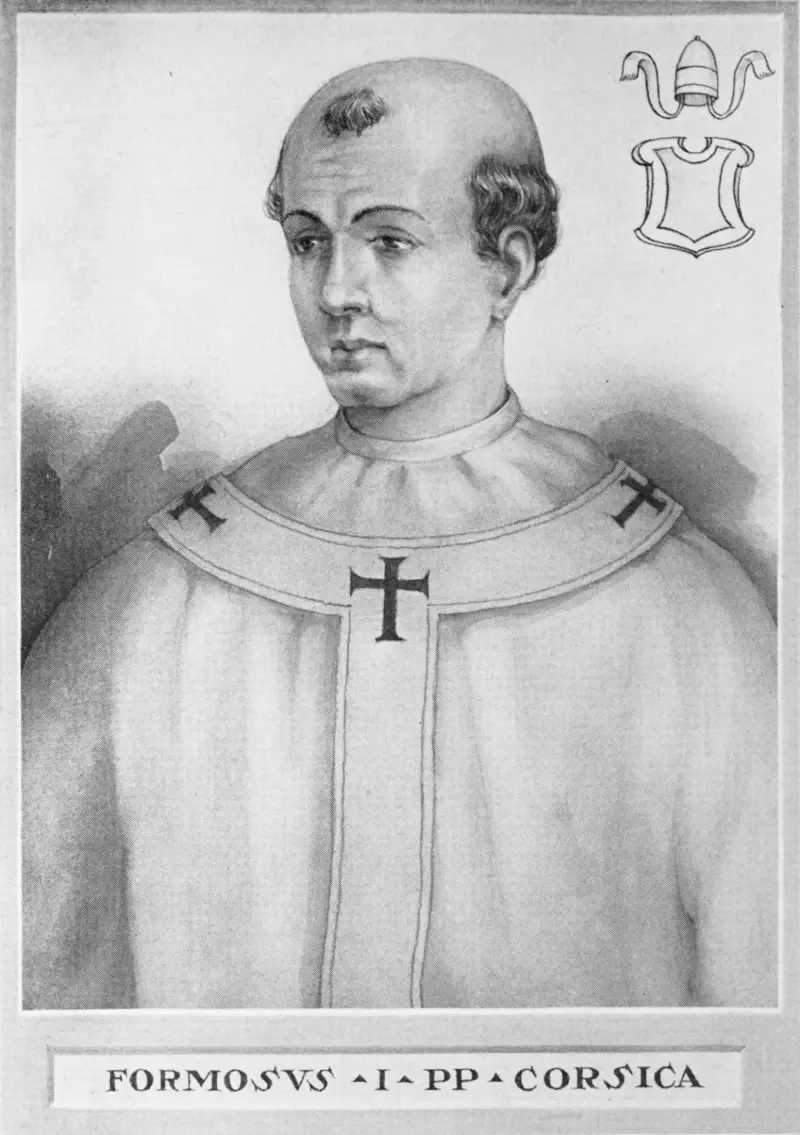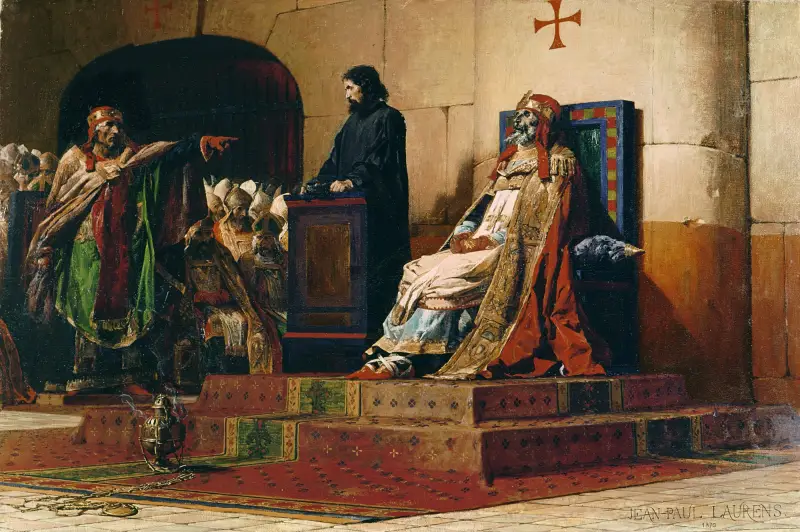Trial over the corpse of the Pope

Pope Formosa
In 897 AD e. The poor fisherman was fishing in the Tiber, but he caught a much more significant catch. He found the body of the previous Pope Formosus. After all, it's not every day that someone pulls out from the Tiber the remains of a pontiff who, nine months after his death, was the protagonist of one of the most extraordinary episodes in history. stories papacy. An episode which the German historian Gregorovius said was "a scene of barbarity the like of which history knows not."
Talking about Formosa and the vicissitudes of his death forces us to fully immerse ourselves in the turbulent political situation in Rome at the end of the 9th century. If you take a quick look at the list of popes of that time, it is already clear that Rome was far from a calm city.
A difficult time in the history of the papacy
Between 872 and 965, Rome saw more than 20 popes, nine of them in just nine years (from 896 to 904). A decent portion of them were killed or overthrown. There have been poisoned pontiffs such as John VIII; imprisoned after a meager month in office, like Leo V, or coming to power barely eighteen years old, like John XII.
During this period, the papacy was involved in a bitter power struggle between the various ruling families of the city and, at the same time, in a wider dispute for control of Italian lands between the emperors of Germany. The latter, throughout the 9th century, positioned themselves as defenders of church and state. The Lords of Italy and the new rising dynasties sought to establish an independent Kingdom of Italy. The political situation was difficult, and it was necessary to have cunning and influential friends in order to sit on the papal throne.
Formosus participated in these conflicts, since in 866 he was appointed bishop of Ostia. He carried out numerous diplomatic missions on behalf of the papacy. With them he visited Bulgaria, Constantinople and the Carolingian court. In those years, Formosus sided with Arnulf of Carinthia, a bastard of the Carolingian imperial dynasty, who sought to establish himself as king of Italy. This option led to Pope John VIII expelling Formosus from his diocese and excommunicating him, fearing that Rome would lose its independence to the Carolingian Empire.
Thus, one night Formosus and his followers fled from Rome under threat of trial for corruption and immorality. Formosus found refuge at the court of Guido Spoleto and remained in Northern Lombardy for several years, waiting for better times. They came with the pontificate of Marinus I, who in 883 lifted the excommunication of Formosus and restored him to the head of the former diocese.
Under the next two pontiffs, the short-lived Hadrian III and Stephen V, Formosus remained quiet in his post until he was elected pope in 891 after Stephen's death.
Emperor's Friend
The new pontiff had to face a difficult political situation. Shortly before this, Guido Spoleto, having defeated his rival, became king of Italy in Pavia, and then went to Rome to force Pope Stephen V to crown him emperor. Formosus had to confirm Guido's coronation and recognize his son Lamberto as successor to the empire. Moreover, Guido Spoleto helped Formoso by sheltering him when he fled from Rome.
However, Formosus looked with concern at the reign of the new king of Italy. Almost immediately he began secretly sending out invitations to Arnulf of Carinthia, now on the Carolingian throne, to come to his aid. In 893, Arnulf made his first raid on Milan and Pavia. Three years later, when Guido died and his son Lamberto was crowned emperor in Rome, Arnulf crossed Italy and besieged Rome.
Inside the city, Spoleto's followers rebelled and captured the pope, imprisoning him in Castel Sant'Angelo. But they could not do anything against the invaders. Formosus was released, and a few days later he crowned Arnulf emperor. A few months later, the Pope died at the age of eighty. The reasons are unknown, but historians are inclined to believe that he was poisoned. Some contemporaries praised him as a just and pious pope; others could not forgive him for betraying Spoleto in the interests of the German Arnulf.
In a world as turbulent, full of intrigue and personal grievances as Rome at the end of the ninth century, history could not just end like that. After the death of Formosus, the Romans elected Boniface VI as Pope, who died 15 days later, allegedly from gout. He may have been helped to die by the next pope, Stephen VI, a former follower of Formosus. Initially he recognized Emperor Arnulf, but as soon as the latter left Italy he joined Lamberto Spoleto.
Deciding to take responsibility for what had happened a few months earlier, Lamberto headed to Rome, which was occupied by his supporters. There he convinced the new pontiff to condemn the actions of Formosus and put an end to the aura of holiness that he created among his own.
The condemnation was to be public and with all the solemnity of ecclesiastical law before the papal curia and all who had the right to vote in the city. The fact that Formosus was dead should not have been an obstacle - he would still be tried, even if the corpse had to be pulled out of the grave. And so it happened.
Trial over a corpse
The pantomime was prepared in every detail. Early in 897, Stephen VI and Lamberto Spoleto ordered Formosus' corpse to be exhumed and brought to court, where cardinals, bishops and church dignitaries were present. Clad in all the papal regalia and dressed as he was in life, Pope Formosus sat on his throne. It even got to the point that a lawyer was appointed to speak on behalf of the accused.

Formosa trial
It was argued that his appointment as pope was illegal because he assumed the see of St. Peter contrary to the rule of canon law prohibiting transfers from one bishopric to another.
The Synod signed the act of deposing Formosus, condemned him and canceled all his appointments and provisions. After this, the papal robes were removed from him and three fingers with which the popes blessed were cut off. After the corpse was carried through the streets of Rome, it was burned and thrown into the Tiber in front of a cheering crowd.
Undoubtedly, this was too much even for what the inhabitants of Rome were used to. Stephen VI himself was imprisoned and strangled there just a few months later. Two years later, John IX rehabilitated the convicted pope and forbade judging the dead.
Years later, the remains of Pope Formosa were finally buried in the Vatican.
Information